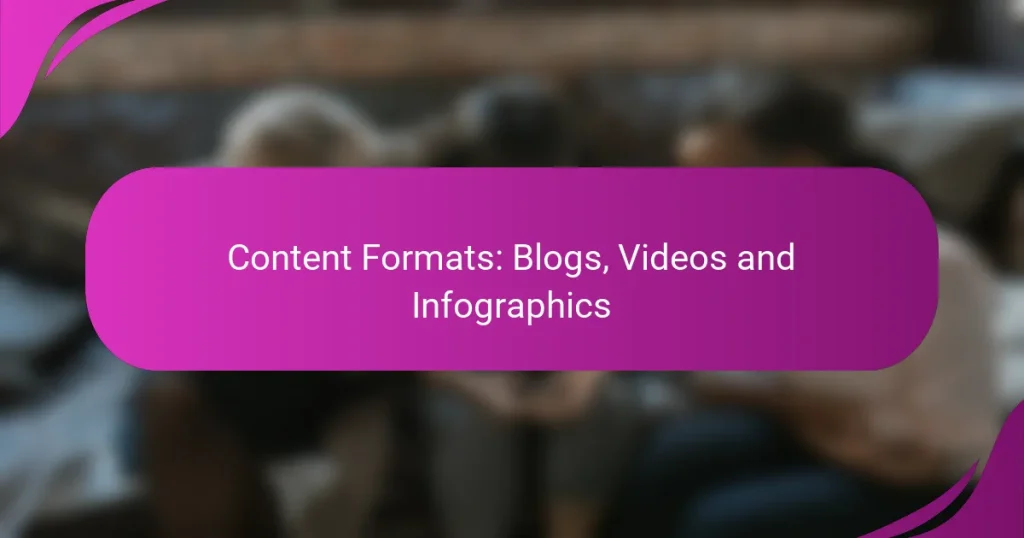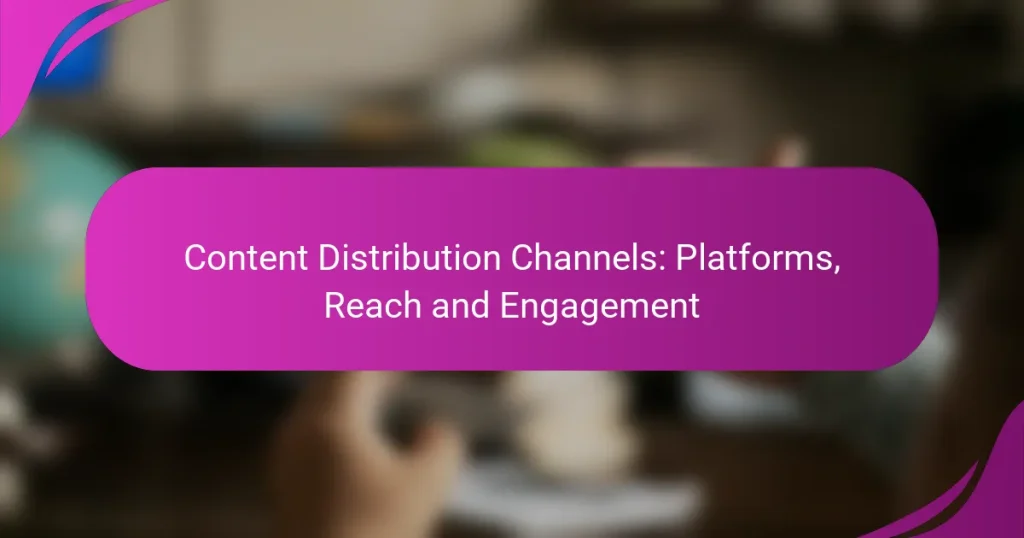Digital marketing services, particularly content marketing strategies, are essential for businesses looking to connect with their audiences effectively. In South Africa, these strategies emphasize local engagement through tailored content that reflects cultural nuances, utilizing methods such as SEO-driven blogs, social media, and influencer collaborations. By measuring success through key performance indicators, businesses can refine their approaches and enhance their overall impact.
Content Formats: Blogs, Videos and Infographics
Visual Content: Design, Engagement and Platforms
Content Distribution Channels: Platforms, Reach and Engagement
Storytelling in Marketing: Connection, Engagement and Brand Loyalty
Content Calendar: Planning, Consistency and Scheduling
Repurposing Content: Strategies, Benefits and Techniques
What are effective content marketing strategies in South Africa?
Effective content marketing strategies in South Africa focus on engaging local audiences through tailored approaches that resonate with cultural nuances. Key strategies include SEO-driven blog content, social media engagement, email marketing campaigns, video content production, and influencer collaborations.
SEO-driven blog content
SEO-driven blog content is essential for improving visibility in search engines and attracting organic traffic. In South Africa, incorporating local keywords and phrases can significantly enhance your content’s relevance to target audiences.
Consider creating informative articles that address common questions or challenges faced by your audience. Aim for a consistent posting schedule, ideally weekly or bi-weekly, to maintain engagement and improve search rankings.
Social media engagement
Social media engagement is crucial for building brand awareness and fostering community interaction. Platforms like Facebook, Instagram, and Twitter are popular in South Africa, making them ideal for sharing content and connecting with followers.
Regularly post engaging content, such as polls, questions, and user-generated content, to encourage interaction. Monitor analytics to understand which types of posts resonate best with your audience and adjust your strategy accordingly.
Email marketing campaigns
Email marketing campaigns are an effective way to nurture leads and maintain customer relationships. In South Africa, personalized emails that cater to the recipient’s interests can lead to higher open and click-through rates.
Segment your email list based on demographics or behavior to tailor your messages. Aim for a frequency of one to four emails per month to keep your audience engaged without overwhelming them.
Video content production
Video content production is increasingly popular and can significantly enhance engagement. South African consumers are drawn to visual storytelling, making platforms like YouTube and TikTok effective for sharing brand messages.
Focus on creating short, impactful videos that highlight your products or services. Consider live streaming events or Q&A sessions to interact with your audience in real-time and build a stronger connection.
Influencer collaborations
Influencer collaborations can amplify your reach and credibility in the South African market. Partnering with local influencers who align with your brand values can help you tap into their established audiences.
When selecting influencers, consider their engagement rates and authenticity. Collaborate on content that feels natural and resonates with their followers, such as product reviews or co-hosted events, to maximize impact.
How can businesses measure content marketing success?
Businesses can measure content marketing success through various metrics that reflect engagement, conversion, and overall effectiveness. Key performance indicators (KPIs) such as website traffic, conversion rates, and social media interactions provide insights into how well content resonates with the target audience.
Website traffic analytics
Website traffic analytics help businesses understand how many visitors engage with their content. Tools like Google Analytics can track metrics such as page views, unique visitors, and average session duration, providing a clear picture of content performance.
To assess the effectiveness of specific content pieces, consider analyzing traffic sources. For example, organic search traffic indicates strong SEO performance, while referral traffic from social media suggests effective promotion strategies.
Conversion rate tracking
Conversion rate tracking measures the percentage of visitors who complete a desired action, such as signing up for a newsletter or making a purchase. This metric is crucial for evaluating the effectiveness of content in driving business goals.
To improve conversion rates, businesses should create clear calls-to-action (CTAs) and ensure landing pages are optimized for user experience. A conversion rate of 2-5% is generally considered good, but this can vary by industry.
Social media metrics
Social media metrics provide insights into how content performs across various platforms. Key metrics include likes, shares, comments, and engagement rates, which indicate audience interaction and interest.
Monitoring these metrics can help businesses refine their content strategies. For instance, high engagement on a specific post may suggest a topic worth exploring further, while low interaction could indicate a need for a different approach or format.
What tools enhance content marketing efforts?
Several tools can significantly improve content marketing efforts by streamlining processes, providing valuable insights, and enhancing design. Utilizing the right combination of these tools can lead to more effective campaigns and better engagement with your audience.
HubSpot for automation
HubSpot is a comprehensive platform that automates various aspects of content marketing, including email campaigns, social media posting, and lead nurturing. By automating repetitive tasks, marketers can focus more on strategy and creativity.
Consider using HubSpot’s workflows to segment your audience and deliver personalized content. This can increase engagement rates and conversion, as tailored messages resonate better with specific groups.
Google Analytics for insights
Google Analytics is essential for tracking user behavior on your website, providing insights into how visitors interact with your content. It helps identify which pieces of content perform well and which need improvement.
Utilize metrics such as bounce rate, average session duration, and conversion rates to gauge the effectiveness of your content marketing strategies. Regularly reviewing these insights allows for data-driven adjustments to your campaigns.
Canva for design
Canva is a user-friendly graphic design tool that enables marketers to create visually appealing content without needing extensive design skills. It offers a wide range of templates for social media posts, infographics, and presentations.
When using Canva, focus on maintaining brand consistency by using your brand colors and fonts. This helps reinforce brand identity across all content, making it more recognizable to your audience.
What are the key components of a content marketing plan?
A content marketing plan consists of several essential components that guide the creation and distribution of valuable content. These elements ensure that the content aligns with business goals and effectively reaches the target audience.
Target audience identification
Identifying the target audience is crucial for a successful content marketing strategy. This involves researching demographics, interests, and pain points to create detailed buyer personas that represent your ideal customers.
Utilize surveys, social media insights, and website analytics to gather data on your audience. This information helps tailor content that resonates with their needs and preferences, increasing engagement and conversion rates.
Content calendar creation
A content calendar is a strategic tool that outlines what content will be published and when. It helps maintain consistency and ensures that all content aligns with marketing goals and seasonal trends.
When creating a content calendar, consider including key dates, themes, and types of content (such as blogs, videos, or infographics). Tools like Google Calendar or dedicated content management software can simplify this process.
Budget allocation
Effective budget allocation is essential for maximizing the impact of your content marketing efforts. Determine how much you can invest in content creation, distribution, and promotion while considering potential returns.
Allocate funds based on the types of content that perform best for your audience. For example, if video content drives higher engagement, consider dedicating a larger portion of your budget to video production and advertising.
How to choose the right content marketing agency in South Africa?
Choosing the right content marketing agency in South Africa involves evaluating their experience, expertise, and alignment with your business goals. Focus on their past work, client feedback, and the range of services they offer to ensure they meet your specific needs.
Portfolio review
A thorough portfolio review is essential when selecting a content marketing agency. Look for case studies that showcase their ability to create engaging content and achieve measurable results. Pay attention to the industries they have worked with to ensure they have relevant experience.
Consider the diversity of their portfolio. A well-rounded agency should demonstrate proficiency in various content types, such as blogs, videos, infographics, and social media posts. This variety indicates their capability to adapt to different marketing strategies.
Client testimonials
Client testimonials provide valuable insights into an agency’s reliability and effectiveness. Seek out reviews from businesses similar to yours to gauge how well the agency understands your market. Positive feedback can highlight strengths, while negative reviews may reveal potential red flags.
Look for testimonials that detail specific outcomes, such as increased engagement or improved conversion rates. This information can help you assess the agency’s impact on previous clients and their ability to deliver results.
Service offerings comparison
Comparing service offerings among agencies is crucial to find the best fit for your needs. Some agencies may specialize in SEO-driven content, while others focus on social media or email marketing. Identify which services align with your marketing strategy.
Create a simple comparison chart to evaluate key services, pricing structures, and any additional features, such as analytics reporting or content distribution. This visual aid can help clarify which agency provides the most comprehensive and relevant services for your business.
What are common content marketing mistakes to avoid?
Common content marketing mistakes can undermine your strategy and lead to wasted resources. Avoiding these pitfalls is crucial for effective engagement and achieving your marketing goals.
Neglecting audience research
Neglecting audience research is a significant mistake that can lead to irrelevant content and missed opportunities. Understanding your target audience’s preferences, behaviors, and pain points is essential for creating content that resonates with them.
To conduct effective audience research, utilize surveys, social media insights, and analytics tools. Aim to gather demographic data, interests, and feedback on existing content to inform your strategy. This information helps tailor your messaging and improves engagement rates.
Common pitfalls include assuming you know your audience without data or failing to update your research regularly. Make it a habit to revisit your audience profiles and adjust your content accordingly to stay relevant and effective.






